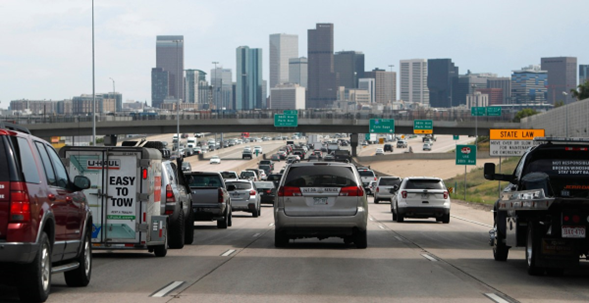Feds are holding up approving a state air quality improvement plan unless Colorado agrees to share information. The Attorney General punches back.

with Interstate 70 just north of downtown Denver. (David Zalubowski, AP Photo, File)
The Environmental Protection Agency says Colorado agencies and citizen watchdogs cannot possibly enforce the Clean Air Act against polluters unless everyone has open public access to the polluters’ records of what they spew into the air.
Until state regulators make it easier to find those records, the EPA says, the federal agency won’t fully approve Colorado’s required plan on how it will attack ozone and other air pollution problems.
Colorado had a swift response to the demand for open government.
The state sued the EPA to fight more open records.
“The current public access, which is zero public access, is great for the polluters,” said Robert Ukeiley, a Colorado attorney on air pollution issues for the Center for Biological Diversity.
“The attorney general’s office is spending hundreds of times more taxpayer money on suing the EPA than it would cost to agree with the EPA that more transparency from polluters is a good thing and give the public access,” Ukeiley said.
Given the failures of more than a decade of state clean air plans to reverse Colorado’s growing ozone pollution problem, with a recent string of high ozone days as the latest examples, Ukeiley said, “Excuse us if we don’t trust that the state has it under control.”
The EPA agreed with portions of the environmental groups’ protest against the state’s air pollution improvement plan.
The EPA has “repeatedly” held that for state pollution-fighting plans to be practically enforceable, people “must have reasonable access to the records allowing enforcement,” according to the agency’s official response to public comments on the plan.
Colorado Attorney General Phil Weiser said state health officials believe there is adequate public access to all permits and company reports, and that making access easier would divert state money and staff time from actually fighting pollution.
“We have a system in place that provides effective and reasonable access to any records for anyone who wants them,” Weiser said, in an interview. “The EPA is asking us to do this, when they’ve never asked us to do it before. They’re not asking other states to do it now. And we don’t really see a basis in law or logic for doing it.”
The current system requires the companies holding an air pollution permit to keep the records and make them available to the state “upon request,” according to the EPA’s decision published in the Federal Register. But states might not do that, the EPA said. “This undermines citizens’ ability to participate in the enforcement” of clean air rules, the agency said.
The EPA’s new demand that the state be the “aggregator or collector, just in case anyone wants it,” Weiser said, “adds what is an unnecessary cost and burdensome step, that will divert valuable state resources to an area that’s just not worth it,” he said.
The EPA said Tuesday it cannot comment on pending litigation. The Colorado attorney general’s lawsuit against the EPA decision was filed directly to the U.S. Tenth Circuit Court of Appeals, as required by the Clean Air Act.
The Center for Biological Diversity, which made the detailed comments in late 2022 that caused the EPA to hold up approval of the state plan, scoffed at the idea a records clearinghouse would cut into pollution control efforts.
“All they have to do is set up an email address to get these documents, and then the polluters just email it to the state,” Ukeiley said. Various divisions of the state health department already have publicly accessible online “drawers” of documents searchable by permit number or location, collecting mandatory reports, enforcement actions and other correspondence. “So the resource burden on the state is pretty darn minimal,” he said.
Environmental attorneys are also critiquing Colorado’s contention to the EPA that the public access to records issue was raised unfairly, at the last second in response to a protest comment. The EPA was ready to approve the state’s usual handling of pollution records up until that moment, the attorney general’s petition says.
“That’s a pretty weak argument,” Ukeiley said. “The courts have consistently said that whenever EPA proposes to approve something, there’s always the possibility that they will change their mind based on comments. It’s like a ‘Scooby-Doo’ episode. ‘I would have gotten away with it, but for you meddling kids.’”
As for next steps on the final approval of the state’s implementation plan for meeting 2008 EPA air pollution standards, Weiser said he hopes the EPA will remove its demand for more open records. That way, he said, Colorado won’t have to continue its appeals court lawsuit against the agency.
The environmental groups, meanwhile, want the EPA to “vigorously” oppose Colorado’s administrative petition on the open records question, and then continue to fight it in the appeals court.
The EPA does that “100% of the time when we sue them to reduce pollution,” Ukeiley said, “so it would be heartbreaking if when they actually make a decision to reduce pollution, they cave.”
Source: The Colorado Sun
August 23, 2023


